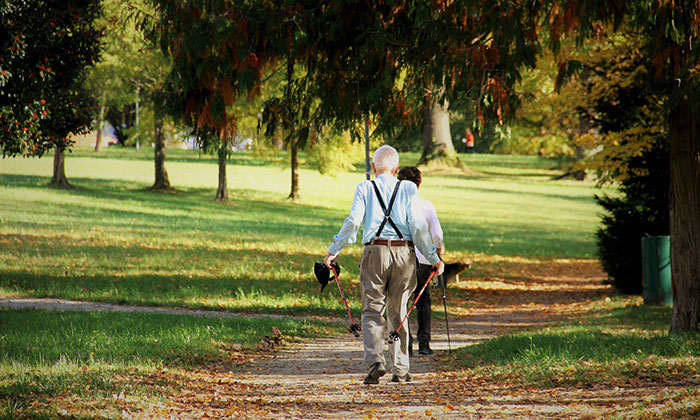Every year, one in four Americans age 65 and older are negatively impacted by a fall, according to the National Council on Aging. Falls are the leading cause of fatal and non-fatal injuries in older adults, and they greatly impact their health and well-being. In addition to threatening their independence, falls generate significant economic and personal challenges for older adults and their caregivers. And by 2030 in the U.S., falls are expected to result in a cost of $101 billion.
However, falls can be prevented. The theme of this year’s National Falls Prevention Awareness Week is ‘Strengthening Community Connections,’ which emphasizes that everyone plays a role in preventing falls and keeping older adults safe.
“We know that with the right education, practical lifestyle adjustments, implementation of evidence-based falls prevention programs and clinical-community partnerships, we can decrease and prevent people from falling,” explained Dr. Sara Pappa, Assistant Professor of Health Sciences at Marymount University and Project Manager with the Northern Virginia Falls Prevention Alliance (NVFPA). “Connecting with local businesses, older adult-serving organizations, government agencies, emergency services and others is important as we work towards reducing falls.”
Through an academic-community partnership based within Marymount’s Center for Optimal Aging, the University and local senior-serving organizations continue to draw on two federal grants, totaling over $1 million, to help reduce the number of falls among older adults in Northern Virginia. Marymount has been a leader in establishing a falls prevention infrastructure across the region thanks to an initial grant from the U.S. Department of Health and Human Services, Administration for Community Living, as well as a second grant in 2018.
“Older adult falls are unfortunately common, but we aim to share the message that they don’t have to be an inevitable part of aging,” said Dr. Rita Wong, Associate Vice President for Research at Marymount University and principal investigator of the grant team. “By performing exercises to maintain strength and balance, making their homes safer and getting regular health check-ups, older adults can significantly reduce their chances of falling and becoming injured.”
So far, more than 500 people have been trained in evidence-based falls prevention programs and 194 falls prevention workshops have been delivered to 5,350 older adults thanks to the work of NVFPA. Headed by Dr. Wong as principal investigator and Dr. Pappa as co-investigator and Project Manager, the organization also includes Dr. Patricia C. Heyn, Founding Director of Marymount’s Center for Optimal Aging, research fellows from the Center and several faculty members from Marymount’s Physical Therapy program.
During the current round of funding, Marymount faculty are working to:
- Expand the activities of Marymount’s regional training office that prepares lay leaders/coaches to run evidence-based falls prevention programs, with an emphasis on reaching underserved communities.
- Provide support to community organizations in establishing programs.
- Continue to grow the NVFPA.
- Build a robust referral network for falls prevention programs.
- Establish academic-community partnerships for falls prevention and optimal aging promotion.
This fall, Marymount and its community partners are hosting several virtual falls prevention events to support National Falls Prevention Awareness Week, which concludes on September 24. In addition, Marymount has assisted many organizations in Northern Virginia in establishing and sustaining three evidence-based falls prevention programs:
- Stay Active and Independent for Life (SAIL): a strength, balance and fitness program for older adults who are at low-to-moderate risk of falling.
- Matter of Balance (MOB): features small group sessions led by a trained facilitator designed to reduce the fear of falling and familiarize older adults with balanced-focused exercise activities.
- Otago Exercise Program: a series of strength and balance exercises targeting older adults at high risk for falling.
In an effort to maintain a presence in the community since the beginning of the COVID-19 pandemic, Dr. Pappa and other partners have been offering virtual SAIL and MOB programs over Zoom. This has allowed older adults in the community to continue to improve their fitness levels and decrease their risk of falling.
“Before COVID-19, most falls prevention programs and classes were only offered in person. But we learned that there are many benefits to having these programs available in a variety of formats,” Dr. Pappa explained. “Going forward, many falls prevention programs will remain available through both face-to-face and remote delivery, further expanding access to those who need it.”
For more information on falls, prevention programs or how to get involved, click here to visit the NVFPA website.





